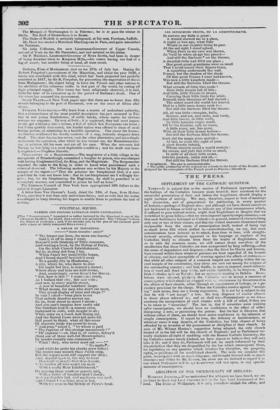SETTLEMENT OF THE CATHOLIC QUESTION.
THE PRESS.
TIMES—It is natural that as the session of Parliament approaches, and the feelings of the Catholics become more feverish, their exertions for the successful prosecution of their suit before the Legislature should display a rapid increase of activity. We may, therefore, expect to hear of meetings for discussion, and of preparations for petitioning, in every quarter of Ireland,—perhaps of England also ; and although we have shown ourselves not backward to blame or hold up to ridicule any of that intemperance which, if suffered to pass without notice, might lead Englishmen to imagine that we were bli nd to gross follies,—that we were imposed upon by empty menaces,—or that such foolishness belonged to Catholics in general, instead of characterizing only one or two of their (waters, and that the violent measures threatened were inseparable from the cause of emancipation itself, instead of being but so much loose filth which defiled it,—notwithstanding, we say, that such considerations have induced us to attack, from time to time, with straight- forward severity, whatever appeared in the language or conduct of the Catholics likely to alienate from them the hearts of Englishmen, and so to ruin the common cause, we still cannot divest ourselves of the recollection that these Catholics are men exasperated by long .suffering,—that the sense of degradation and disgrace,—that the thirst for liberty and honour, have roused within them whatever passions are least regardful of the bounds of sobriety, and least susceptible of warning against the effects of rashness,— that while all other subjects of a common empire can worship within the sa- cred temple of the constitution' they alone are cast out among the corpses of the surrounding cemetry ; and that, finally, to men so angered, much indiscre- tion of word and deed may fairly, and ought rightfully, to be forgiven. The Irish Catholics held on Tuesday last an agqn..<.f.oe meeting in Dublin. Reso- lutions were adopted, pledging the Catholics not to accept a measure of emancipation which should be clogged with an interference by Government in the affairs of their church, either through an appointment of bishops, or a pe- cuniary provision for the clergy. When the Catholics resolve against "accept- ing" such terms, they use a wrong expression. It is not for a subject to say that he will " not accept" a law. He may disprove of similar clauses to those above referred to; and so shall we—Protestestants as we arc— condemn the incorporation of such clauses with a bill of relief, if they are to be taken as " securities." The fact is, that if securities were wanting alter emaucipation, we should have no confidence in the effect of either interposing a veto, or pensioning the priests. But the fact is likewise, that without either of them, we should have entire confidence in the talisman of simple emancipation. If report be true, the delicacy or fastidiousness, or whatever name it may deserve, of the Catholics, has little chance of being offended by an invasion of the government or discipline of their church. In case of Mr. Wilmot Horton's suggestion being adopted, the only church treated of in the bill will be the church of England; and as Parliament vir- tually disclaims all right of meddling with the Roman Catholic hierarchy, the lay Catholics cannot surely (indeed, we have reason to believe they will not) take it ill; and if they do, Parliament will not be much influenced by their dissatisfaction that they are disqualified by the law which emancipates them, for legislating on any question which involves the discipline, the property, rights, or privileges of the established church. The more we consider this point, investigated with so much diligeoce, and brought forward with so much clearness and ability by Mr. Horton, the more are we inclined to regard it as one which Parliament will be apt to embrace and rest upon, in any specific measure of emancipation.


















 Previous page
Previous page